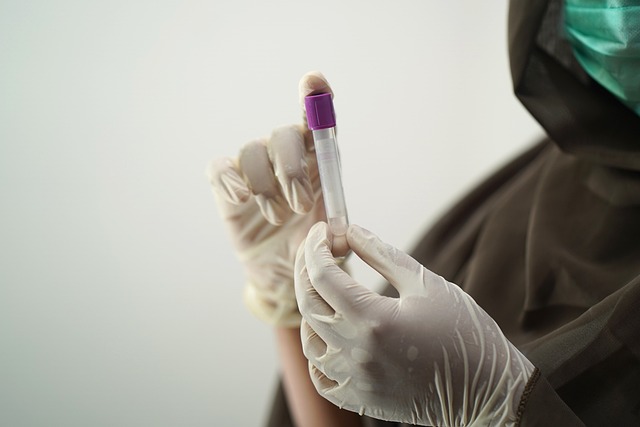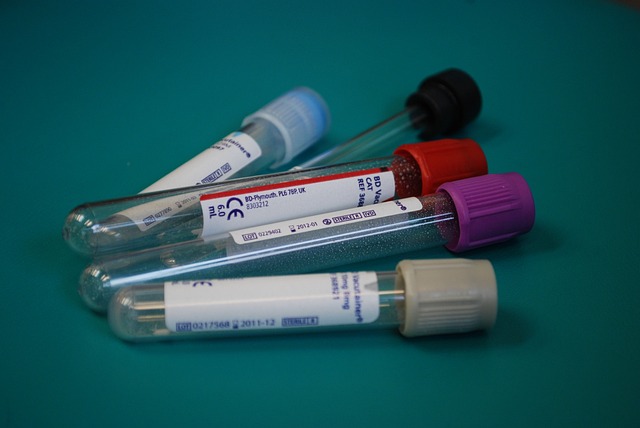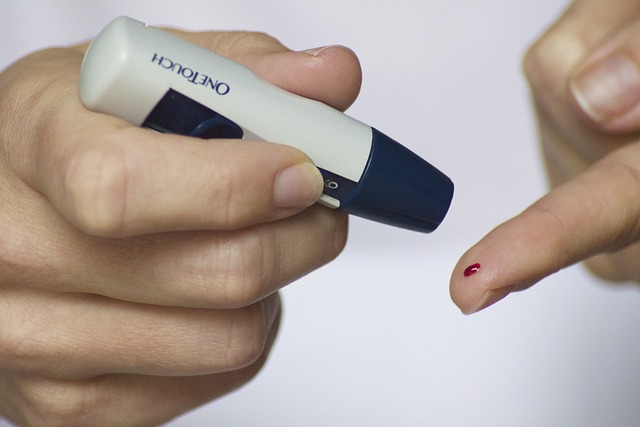The UK Male Hormone Blood Test is a specialized diagnostic tool for evaluating cardiovascular risk factors in men by measuring total cholesterol, LDL cholesterol, HDL cholesterol, and triglycerides. This test considers hormonal influences on lipid metabolism specific to males, ensuring accurate assessments. Regular testing aids early detection of potential heart disease risks, allowing for timely interventions and lifestyle changes to manage cholesterol effectively, in line with UK health guidelines which recommend total cholesterol under 5 mmol/L, LDL below 3 mmol/L without cardiovascular disease, and HDL above 1 mmol/L. Men should focus on a balanced diet, regular exercise, maintaining a healthy weight, avoiding smoking, moderating alcohol intake, and considering medication like statins if necessary. The UK Male Hormone Blood Test provides comprehensive insights into a man's health, informing preventative strategies or treatment options to support long-term wellness. Men over 40, particularly those concerned about hormonal impacts on cholesterol, should consider this test as part of their health management plan.
UK men play a pivotal role in monitoring their health, with cholesterol level testing paving the way for informed medical decisions. A UK Male Hormone Blood Test not only assesses hormonal balance but also provides critical insights into cholesterol levels—a key determinant of cardiovascular health. This article delves into the intricacies of interpreting cholesterol test results, guiding men through the process and offering actionable steps to manage and enhance their cholesterol profiles. Understanding these aspects is essential for maintaining optimal health and preventing potential heart issues.
- Deciphering Cholesterol Levels: The Role of the UK Male Hormone Blood Test
- Understanding the Process and Interpreting Results of Cholesterol Level Tests in Men
- Actionable Steps Post-Test: Managing and Improving Your Cholesterol Profile as a UK Male
Deciphering Cholesterol Levels: The Role of the UK Male Hormone Blood Test

The UK Male Hormone Blood Test is a pivotal diagnostic tool that provides insights into an individual’s cholesterol levels, offering a comprehensive assessment of cardiovascular health. This test specifically measures the levels of total cholesterol, low-density lipoprotein (LDL) cholesterol, high-density lipoprotein (HDL) cholesterol, and triglycerides within the bloodstream. Understanding these components is crucial for managing heart disease risk, as imbalances can indicate a predisposition to arterial blockages or other cardiovascular issues. HDL cholesterol, often referred to as ‘good’ cholesterol, plays a protective role by removing excess cholesterol from the blood and transporting it back to the liver for breakdown. Conversely, LDL cholesterol, known as ‘bad’ cholesterol, can build up on the artery walls, leading to narrowed arteries and increased risk of heart attack or stroke if levels are too high. The UK Male Hormone Blood Test is specifically tailored for men, considering the distinct hormonal influences that affect lipid metabolism in males. It thereby serves as an indispensable tool in the preventative healthcare strategy for men, enabling early detection and management of cholesterol-related health risks. Regular monitoring through this test can lead to lifestyle modifications or medical interventions when necessary, thereby mitigating the risk of cardiovascular events and promoting overall well-being.
Understanding the Process and Interpreting Results of Cholesterol Level Tests in Men

Regular monitoring of cholesterol levels is a critical aspect of maintaining cardiovascular health in men, and it begins with a simple blood test, such as the UK Male Hormone Blood Test. This comprehensive analysis not only measures total cholesterol but also distinguishes between high-density lipoprotein (HDL) or “good” cholesterol and low-density lipoprotein (LDL) or “bad” cholesterol. Understanding the process of this test is pivotal; it involves fasting to ensure accurate readings, as certain foods can transiently alter cholesterol levels. After a mandatory period without food intake, a healthcare professional will collect a blood sample from a vein in the arm. This sample is then sent to a laboratory equipped to assess the various lipid components present in the blood.
Interpreting the results of a cholesterol level test is as crucial as the testing process itself. In the UK, male hormone profiles, including cholesterol levels, are benchmarked against specific guidelines that categorize LDL and HDL measurements to determine cardiovascular health risk. Total cholesterol levels should ideally be under 5 mmol/L, with LDL cholesterol targets being less than 3 mmol/L for individuals without known cardiovascular disease. Conversely, HDL cholesterol should be above 1 mmol/L, as higher levels are associated with a lower risk of heart disease. Men with high-risk cholesterol levels may need to adopt lifestyle changes or consider medical interventions to manage their lipid profiles and reduce the likelihood of developing cardiovascular conditions. The UK Male Hormone Blood Test provides a comprehensive overview of hormonal and cholesterol markers, offering insights into overall health and guiding preventative measures or treatment plans accordingly.
Actionable Steps Post-Test: Managing and Improving Your Cholesterol Profile as a UK Male

Upon receiving your cholesterol levels through a blood test, a UK male has several actionable steps to manage and improve his cholesterol profile. The first step involves understanding the results; high-density lipoprotein (HDL), often referred to as ‘good’ cholesterol, should be above 1mmol/L, while low-density lipoprotein (LDL), known as ‘bad’ cholesterol, should ideally be less than 3.5mmol/L. If your LDL levels are high, lifestyle changes are pivotal. Adopt a heart-healthy diet rich in fruits, vegetables, whole grains, and lean proteins, while limiting saturated fats and trans fats found in processed foods and red meats. Regular physical activity is equally important; aim for at least 150 minutes of moderate aerobic exercise per week. If necessary, your healthcare provider may also recommend medication such as statins to help manage cholesterol levels. Additionally, consider a UK Male Hormone Blood Test if you’re over 40, as hormonal imbalances can affect cholesterol metabolism. Monitoring your weight and maintaining a healthy Body Mass Index (BMI) can also contribute significantly to keeping cholesterol in check. Lastly, avoid smoking and limit alcohol intake, as both can negatively impact cholesterol levels and overall cardiovascular health. By making informed dietary choices, engaging in regular physical activity, and managing other lifestyle factors, a UK male can effectively manage and improve his cholesterol profile. Consult with healthcare professionals for personalized advice and to explore options like the UK Male Hormone Blood Test for a comprehensive approach to wellness.
Regular monitoring of cholesterol levels through blood tests, including the specialized UK Male Hormone Blood Test, is a critical step in maintaining cardiovascular health. This article has demystified the process and interpretation of these tests, offering clear guidance for UK males on managing their cholesterol profiles post-test. By understanding the intricacies of cholesterol and its implications for hormonal balance, men can take informed actions to improve their heart health. It is imperative for men to prioritize regular screenings and adhere to lifestyle changes that optimize their lipid profiles, thereby reducing their risk of cardiovascular disease.
